Sparrows are small, plump birds that are often seen in urban and rural areas. They are known for their chirping songs and active behavior, which includes rolling in the dirt.
This curious behavior has been observed by bird watchers and animal lovers for years, but many are still unaware of why sparrows engage in this activity.
In this blog, we will explore the various reasons behind this interesting behavior and why it is important to these birds.
So, if you are interested to learn about it, buckle up, and let’s dive into the world of sparrows and their love for rolling in the dirt.
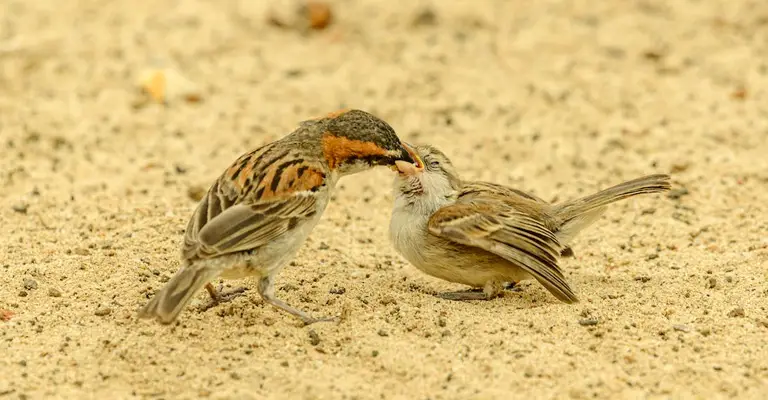
The Function of Dirt Bathing for Sparrows
Sparrows are very intelligent birds and they must have reasons for their dirty bath. The function of their action will simply amaze you when you will learn it. Just check them right below.
Maintaining Clean Feathers
Sparrows are birds that rely on their feathers for insulation, protection, and flight. Keeping their feathers clean is essential for their survival.
Dirt bathing helps to remove dirt, dust, and oil from the feathers, which can build up over time and make it difficult for them to fly and maintain their body temperature.
When sparrows roll in the dirt, they rub their feathers against the ground, which helps to remove any impurities and keep their feathers in top condition.
Ridding of Parasites
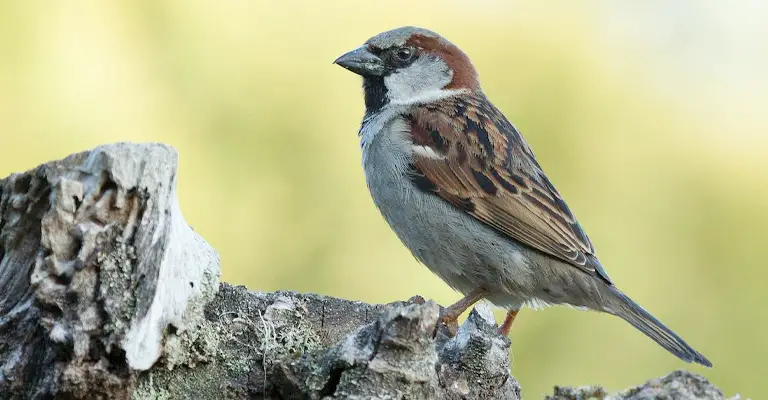
Sparrows are susceptible to a variety of parasites, such as mites and lice, that can infest their feathers and skin. Dirt bathing helps to remove these parasites and prevent infestations.
When sparrows roll in the dirt, they also shake their feathers, which can dislodge any parasites that have taken up residence in their feathers.
In addition, the dust and dirt from the ground can suffocate and kill parasites, providing a natural and effective way for sparrows to keep themselves free from these pests.
Thermoregulation
Sparrows are warm-blooded birds that need to regulate their body temperature in order to maintain their internal processes. Dirt bathing can help them do this by providing a means of cooling down on hot days.
When sparrows roll in the dirt, they expose their skin to cool ground, which can help to lower their body temperature. In addition, the dust from the dirt can help to absorb excess moisture, further assisting with thermoregulation.
Socializing and Bonding With Other Sparrows
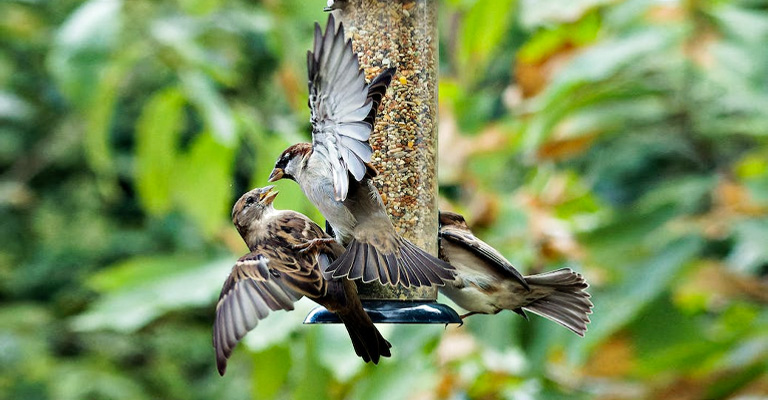
Sparrows are social birds that live in flocks and form close bonds with each other. Dirt bathing can also be a way for them to socialize and bond with their flock mates.
When sparrows bathe in the dirt together, they engage in playful and interactive behavior, which can strengthen their social bonds.
In addition, dirt bathing can also be a way for sparrows to assert their dominance and establish their place in the flock hierarchy.
Dirt bathing is a crucial behavior for sparrows that serves multiple functions, including maintaining clean feathers, ridding parasites, regulating their body temperature, and socializing with their flock mates.
Understanding the reasons behind this behavior can help us appreciate these small birds even more and appreciate their intricate and complex lives in the wild.
The Science Behind Dirt Bathing
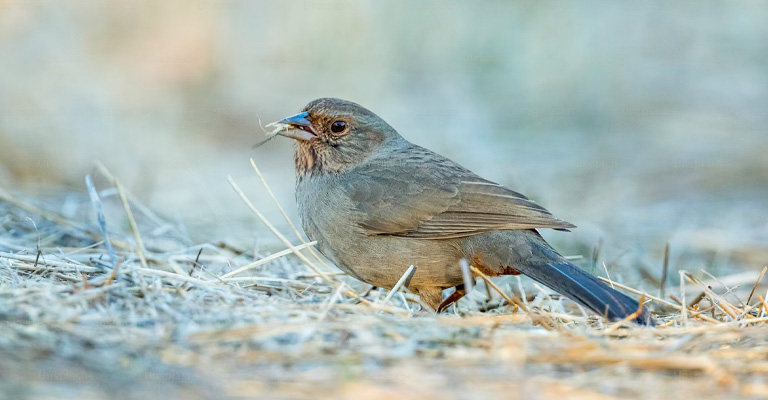
The dearth bathing of sparrows must have some scientific explanation behind it. Learning the explanation will definitely make things more clear to you.
The Role of Dirt in Removing Oils and Grime
Birds like sparrows have preen glands at the base of their tail which secrete an oil that helps to keep their feathers waterproof, flexible, and free of dirt and parasites.
Over time, however, this oil can build up, making the feathers stiff and reducing their ability to insulate the bird. Dirt bathing helps sparrows to remove this buildup of oil and grime from their feathers, leaving them clean, soft, and flexible.
The Use of Dust and Sand to Rid of Parasites
Sparrows, like other birds, are prone to infestations of parasites such as mites, lice, and ticks. These parasites can cause skin irritation, disrupt the normal functioning of feathers, and lead to the spread of disease.
Dirt bathing provides a means for sparrows to rid themselves of these parasites by dusting their bodies with fine particles of sand and dirt, which physically remove the pests.
The Physiological Effects of Dirt on Sparrows
In addition to removing oils and grime and ridding of parasites, dirt bathing has been shown to have several other benefits for sparrows. For one, the act of dust bathing stimulates blood circulation, which helps to maintain good physical health.
Dirt also contains essential minerals and nutrients that sparrows can absorb through their skin, helping to keep them healthy and strong. Finally, the act of dirt bathing has been shown to release endorphins in sparrows, providing a natural form of stress relief and promoting overall well-being.
The Importance of Clean Feathers for Sparrows
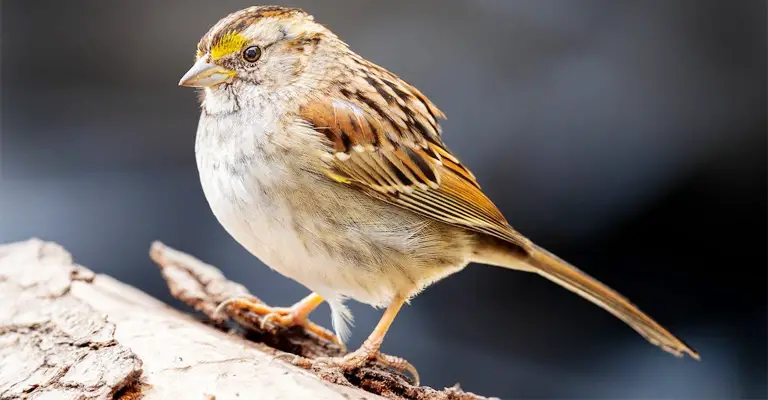
Now, you must be thinking about the importance of sparrows having clean feathers, right? Well, there is no doubt that sparrows need clean wings. Here are the reasons behind it.
Improved Flight and Agility
Clean feathers are crucial for sparrows to maintain their flight and agility. When feathers become dirty and coated with oils, they can become heavy and stiff, making it difficult for the birds to fly and maneuver.
Clean feathers, on the other hand, are lighter and more flexible, allowing the sparrows to fly more efficiently and with greater ease.
Better Insulation and Protection From Weather
Sparrows rely on their feathers for insulation and protection from the elements. Dirty feathers can reduce their ability to stay warm and dry, making them more vulnerable to the effects of extreme temperatures and precipitation.
Clean feathers, on the other hand, provide better insulation and protection, keeping the sparrows comfortable and safe in all types of weather.
Increased Courtship Success
Clean feathers are also important for sparrows during the breeding season. A well-groomed appearance, with clean and well-maintained feathers, can increase a male sparrow’s chances of attracting a mate and securing territory.
This is because clean feathers are a visual indicator of good health and fitness, which are important factors in the courtship process. In turn, having a successful mating and breeding season can help to ensure the survival of the species.
Dirt Bathing in Sparrows – Key Benefits and Features
| Benefits of Dirt Bathing | Description |
| Maintaining clean feathers | Sparrows use dirt and dust to remove oils and grime from their feathers, ensuring they remain clean and in good condition. |
| Ridding of parasites | Dust and sand can help to rid sparrows of external parasites, such as lice and mites. |
| Thermoregulation | Dirt bathing can help sparrows regulate their body temperature, especially during hot weather. |
| Socializing and bonding | Sparrows also engage in dirt bathing as a social activity, allowing them to bond and interact with each other. |
| Improved flight and agility | Clean feathers are essential for efficient flight, allowing sparrows to fly with greater ease and agility. |
| Better insulation and protection | Clean feathers provide better insulation, protecting sparrows from extreme temperatures and weather conditions. |
| Increased courtship success | Male sparrows with clean, well-groomed feathers are more likely to be successful in courtship, attracting mates and establishing breeding territories. |
FAQs
Can sparrows roll in dirt year-round?
Yes, sparrows can roll in dirt year-round, but the frequency of their dirt bathing may change depending on the season and their individual needs. During the breeding season, they may dust bathe more frequently to maintain their clean feathers and rid of parasites, while in the non-breeding season, they may do it less frequently.
What is the difference between dirt bathing and dust bathing?
Dirt bathing and dust bathing are similar in that they both involve rolling and tossing in dry, loose material, but the materials used can be different. Dirt bathing involves rolling in soil or mud, while dust bathing involves rolling in dry sand or dust.
Do all species of birds dirt bath?
No, not all species of birds engage in dirt bathing. It is most commonly observed in passerine birds, such as sparrows, finches, and thrushes, but it can also be seen in some species of pigeons, chickens, and ducks.
Can birds get sick from dirt bathing?
No, dirt bathing is a natural behavior that is beneficial for birds, and it does not typically make them sick. However, if the dirt or sand they are rolling in is contaminated with chemicals or pollutants, it could be harmful to the birds.
Is dirt bathing necessary for all birds or just sparrows?
Dirt bathing is not necessary for all birds, but it is a natural and important behavior for many species, including sparrows. It serves several purposes, including maintaining clean feathers, ridding parasites, regulating body temperature, and socializing with other birds.
Conclusion
Dirt bathing is a critical aspect of a sparrow’s daily routine and plays a crucial role in maintaining their health and well-being.
This behavior helps the birds to maintain clean feathers, rid of parasites, regulate their body temperature, and socialize with other sparrows.
The dirt and dust serve to remove oils and grime from their feathers and the use of dust and sand helps to rid of parasites.
Clean feathers are essential for improved flight and agility, better insulation and protection from the weather, and increased courtship success.
So, it is essential for sparrows to roll in dirt and I think you know the reasons after reading this blog. Thank you for your support.